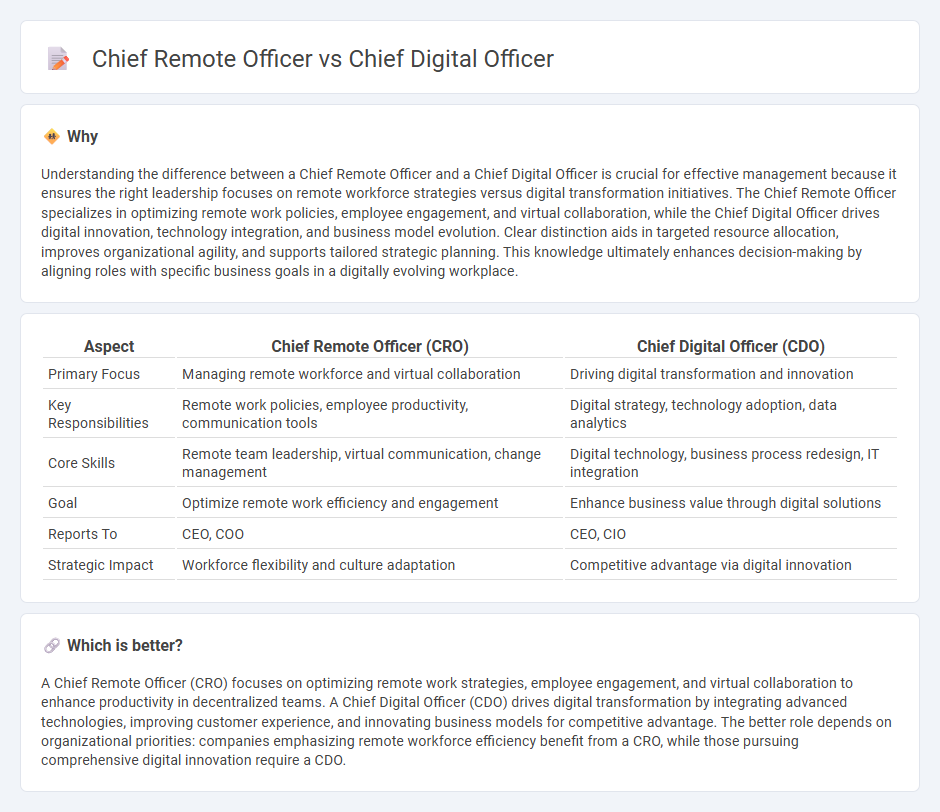
Chief Remote Officers specialize in overseeing distributed workforce strategies, ensuring effective virtual collaboration, productivity, and employee engagement across diverse geographical locations. Chief Digital Officers focus on driving digital transformation, leveraging technology to enhance business models, customer experience, and operational efficiency. Explore the distinct roles and impact of these leaders in modern organizational management.
Why it is important
Understanding the difference between a Chief Remote Officer and a Chief Digital Officer is crucial for effective management because it ensures the right leadership focuses on remote workforce strategies versus digital transformation initiatives. The Chief Remote Officer specializes in optimizing remote work policies, employee engagement, and virtual collaboration, while the Chief Digital Officer drives digital innovation, technology integration, and business model evolution. Clear distinction aids in targeted resource allocation, improves organizational agility, and supports tailored strategic planning. This knowledge ultimately enhances decision-making by aligning roles with specific business goals in a digitally evolving workplace.
Comparison Table
| Aspect | Chief Remote Officer (CRO) | Chief Digital Officer (CDO) |
|---|---|---|
| Primary Focus | Managing remote workforce and virtual collaboration | Driving digital transformation and innovation |
| Key Responsibilities | Remote work policies, employee productivity, communication tools | Digital strategy, technology adoption, data analytics |
| Core Skills | Remote team leadership, virtual communication, change management | Digital technology, business process redesign, IT integration |
| Goal | Optimize remote work efficiency and engagement | Enhance business value through digital solutions |
| Reports To | CEO, COO | CEO, CIO |
| Strategic Impact | Workforce flexibility and culture adaptation | Competitive advantage via digital innovation |
Which is better?
A Chief Remote Officer (CRO) focuses on optimizing remote work strategies, employee engagement, and virtual collaboration to enhance productivity in decentralized teams. A Chief Digital Officer (CDO) drives digital transformation by integrating advanced technologies, improving customer experience, and innovating business models for competitive advantage. The better role depends on organizational priorities: companies emphasizing remote workforce efficiency benefit from a CRO, while those pursuing comprehensive digital innovation require a CDO.
Connection
The Chief Remote Officer (CRO) and Chief Digital Officer (CDO) collaborate to drive organizational transformation by integrating remote work strategies with digital technologies, enhancing productivity and operational efficiency. Both roles focus on leveraging digital tools to enable seamless communication, data management, and workflow automation across dispersed teams. Their partnership ensures the alignment of digital innovation with remote workforce management, fostering agility and competitive advantage in a digital economy.
Key Terms
**Chief Digital Officer:**
The Chief Digital Officer (CDO) spearheads digital transformation by integrating advanced technologies like AI, IoT, and cloud computing to optimize business processes and enhance customer experiences. This role focuses on driving innovation, data-driven strategies, and digital business models to maintain competitive advantage. Discover more about how a Chief Digital Officer shapes future-ready enterprises.
Digital Transformation
The Chief Digital Officer (CDO) drives digital transformation by implementing advanced technologies and data strategies to optimize business processes and enhance customer experiences. In contrast, the Chief Remote Officer (CRO) specializes in managing and optimizing remote work environments, ensuring seamless collaboration and productivity across distributed teams. Explore the distinct roles of CDO and CRO to understand how each contributes to successful digital transformation initiatives.
Data Strategy
A Chief Digital Officer (CDO) drives data strategy by integrating digital technologies to enhance business intelligence, ensuring data governance, analytics, and digital transformation align with organizational goals. In contrast, a Chief Remote Officer (CRO) emphasizes data strategy supporting remote workforce management, focusing on communication tools, performance metrics, and secure data access for distributed teams. Discover how these roles shape data strategy for competitive advantage in modern enterprises.
Source and External Links
What Is a Chief Digital Officer (CDO)? - This webpage defines the Chief Digital Officer as a senior executive responsible for driving digital transformation and leveraging technology to create business value.
How to Become a Chief Digital Officer - This article provides guidance on becoming a Chief Digital Officer, emphasizing the need for extensive experience, technology knowledge, and leadership skills to guide digital transformation.
Chief digital officer - This Wikipedia entry describes the Chief Digital Officer as a role focused on driving growth by converting traditional businesses into digital ones using modern technologies and data.
 dowidth.com
dowidth.com